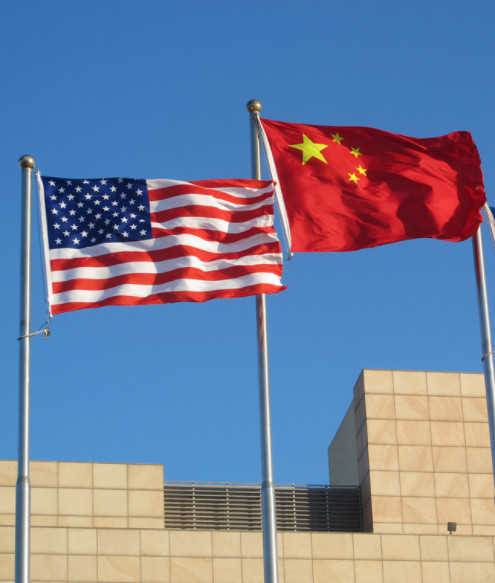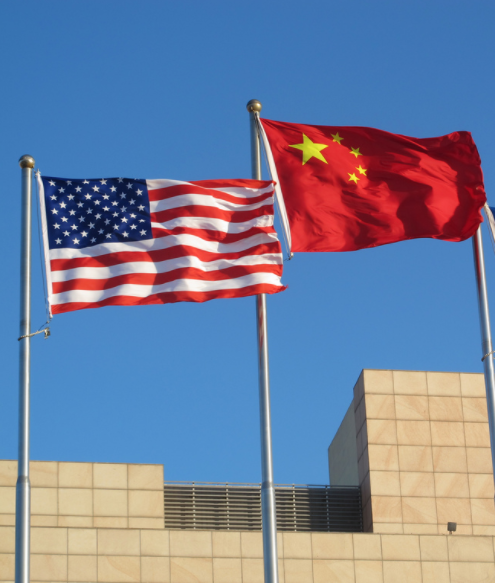
CDC Global via flickr
The authorities of the United States and China, following results of the two-day talks held in Beijing, failed to find a solution to current problems. The American delegation was headed by the Minister of Finance Stephen Mnuchin and the Minister of Trade Wilbur Ross. After the negotiations, the departments reported that the meetings will continue in the "quarterly format". According to the Chinese state news agency Xinhua, the parties agreed on "some issues", but there are still "significant differences" between them. Earlier, the USA promised to introduce duties on technological imports from China up to $ 150 billion, while China announced its readiness to take countermeasures in the same amount.
Claims of the American side were set forth on four pages and were even more ambitious than previously stated: in particular, Washington demands cutting the trade deficit between the two countries no longer by $ 100 billion, but by $ 200 billion by the end of 2020 (now $ 375 billion), as well as a reduction in the import tariffs of the PRC in most sectors to the level of the US (previously they insisted on reducing import duties on cars, which are 25% in China, and 2.5% - in the USA; Beijing has already promised lower tariffs by 2022). In addition, China must abolish non-market subsidies in the priority sectors identified in plan-2025 (involves the development of technology sectors of the economy), and stop cyberattacks aimed at theft of intellectual property, trade secrets and confidential information.
At the same time, the American side asks Beijing not to take retaliatory measures if the US restricts investments in sensitive technological sectors in connection with the requirements for protecting national security, and also refuses to consider the suit in the WTO. The Chinese authorities, in turn, are waiting for withdrawal of charges related to investigation of intellectual property theft, as well as easing restrictions on the work of Chinese companies in the US (in particular, new prohibitions on sales in the country concerned ZTE and Huawei companies) and restrictions on the export of American products to China.
The USA has already used a similar approach with extremely high initial requirements during negotiations on the North American Free Trade Area (NAFTA). However, they have already abandoned the requirement to increase the share of American components in cars assembled in Mexico, entering the US market duty-free, to 50% (currently less than 20%). Instead, it is expected that the parties will increase the overall threshold for the minimum proportion of components from the NAFTA countries (currently 62.5%).
"The administration has already developed a tendency to conclude deals before the change of political cycles. Therefore, Washington, most likely, will try to conclude an updated agreement on NAFTA in the coming month, so that Mexican lawmakers managed to pass it through parliament," Capital Economics expects. However, even if the White House exhibits the same flexibility in negotiations with China, the limitations related to the technological rivalry between the two countries are likely to remain on the agenda for a long time, BlackRock believes.
source: bloomberg.com
Claims of the American side were set forth on four pages and were even more ambitious than previously stated: in particular, Washington demands cutting the trade deficit between the two countries no longer by $ 100 billion, but by $ 200 billion by the end of 2020 (now $ 375 billion), as well as a reduction in the import tariffs of the PRC in most sectors to the level of the US (previously they insisted on reducing import duties on cars, which are 25% in China, and 2.5% - in the USA; Beijing has already promised lower tariffs by 2022). In addition, China must abolish non-market subsidies in the priority sectors identified in plan-2025 (involves the development of technology sectors of the economy), and stop cyberattacks aimed at theft of intellectual property, trade secrets and confidential information.
At the same time, the American side asks Beijing not to take retaliatory measures if the US restricts investments in sensitive technological sectors in connection with the requirements for protecting national security, and also refuses to consider the suit in the WTO. The Chinese authorities, in turn, are waiting for withdrawal of charges related to investigation of intellectual property theft, as well as easing restrictions on the work of Chinese companies in the US (in particular, new prohibitions on sales in the country concerned ZTE and Huawei companies) and restrictions on the export of American products to China.
The USA has already used a similar approach with extremely high initial requirements during negotiations on the North American Free Trade Area (NAFTA). However, they have already abandoned the requirement to increase the share of American components in cars assembled in Mexico, entering the US market duty-free, to 50% (currently less than 20%). Instead, it is expected that the parties will increase the overall threshold for the minimum proportion of components from the NAFTA countries (currently 62.5%).
"The administration has already developed a tendency to conclude deals before the change of political cycles. Therefore, Washington, most likely, will try to conclude an updated agreement on NAFTA in the coming month, so that Mexican lawmakers managed to pass it through parliament," Capital Economics expects. However, even if the White House exhibits the same flexibility in negotiations with China, the limitations related to the technological rivalry between the two countries are likely to remain on the agenda for a long time, BlackRock believes.
source: bloomberg.com





